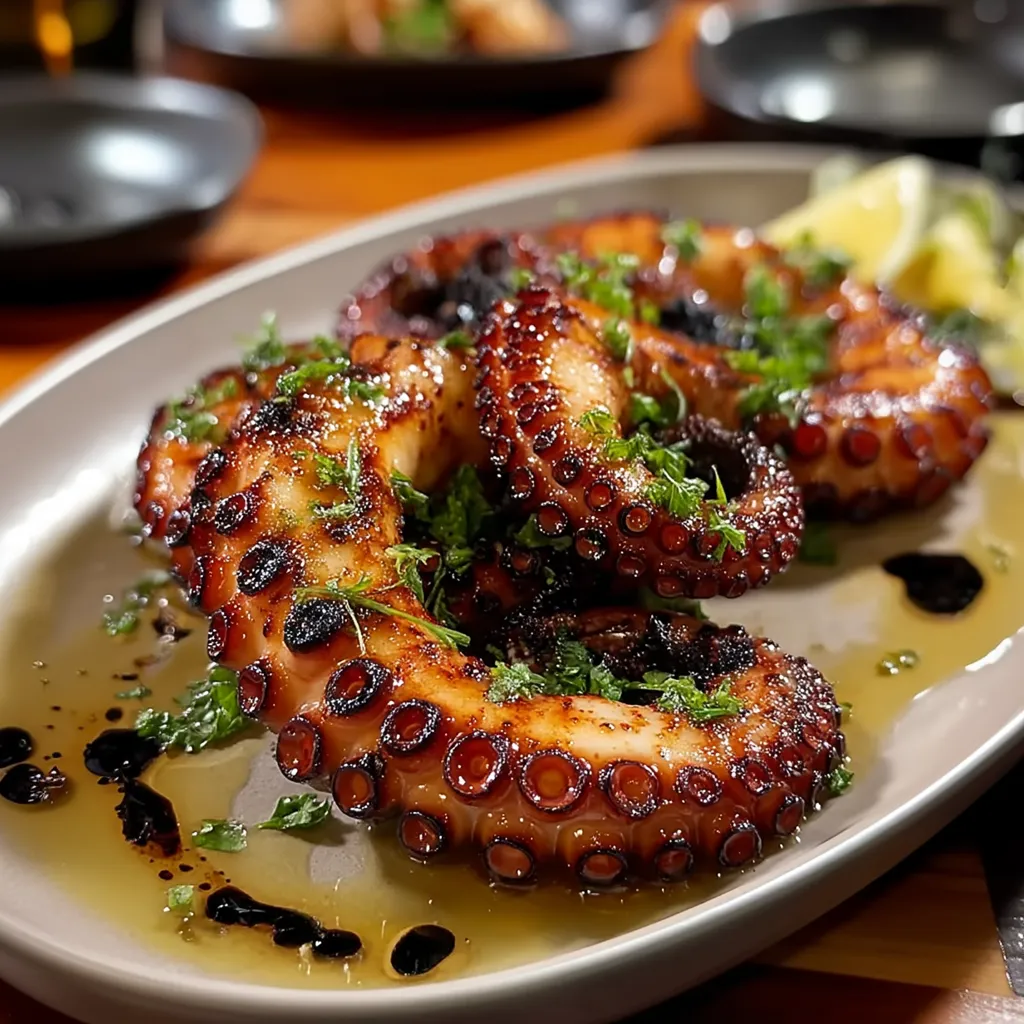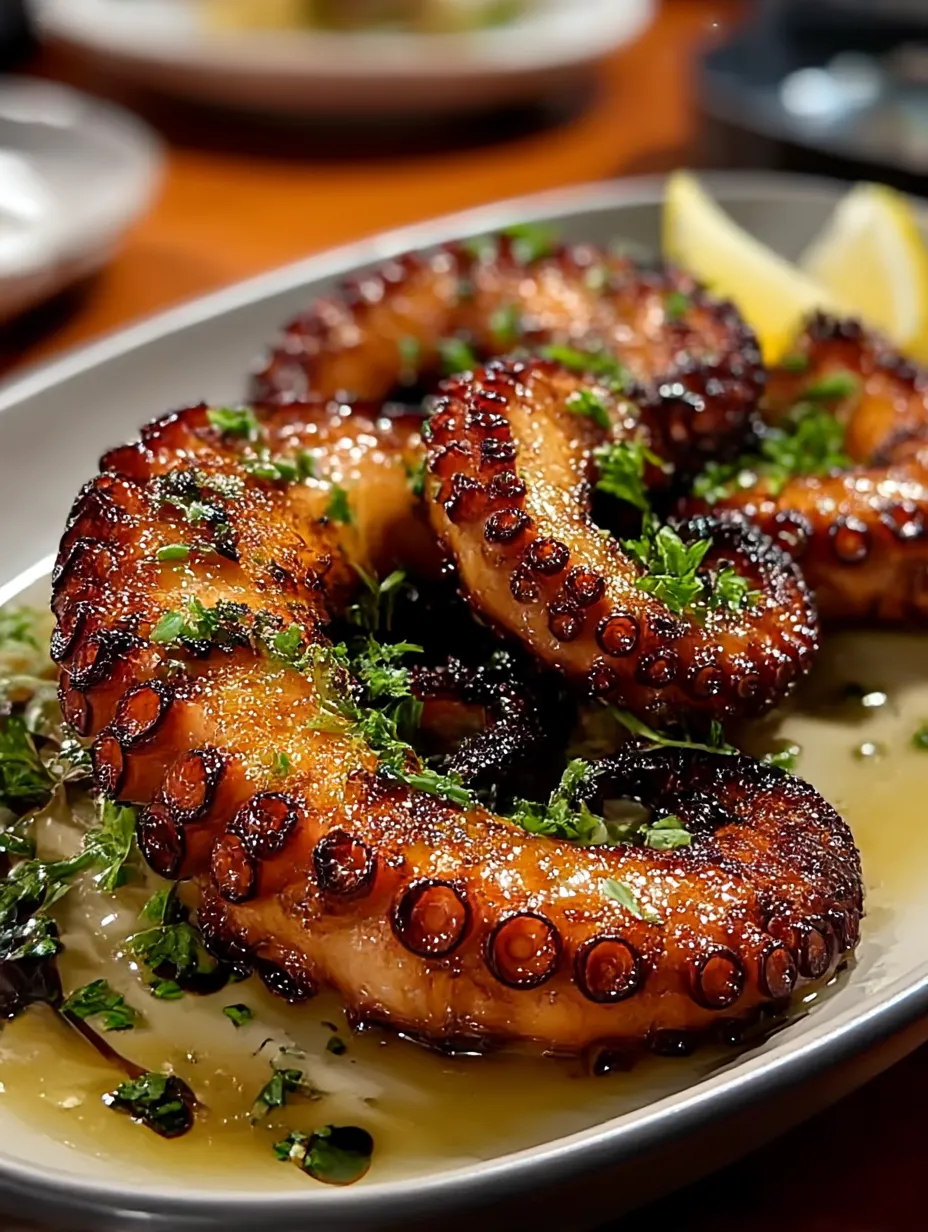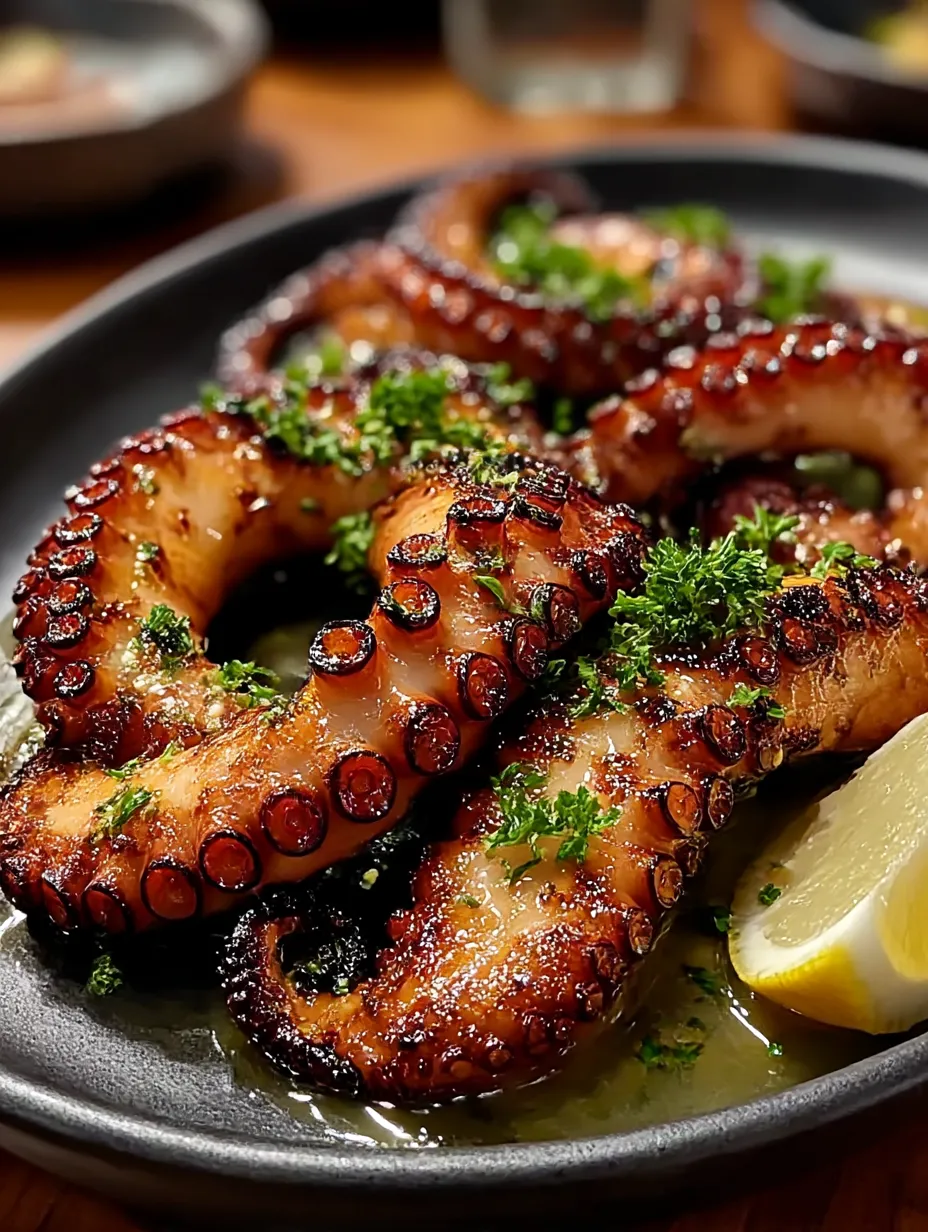 Pin it
Pin it
This juicy Mediterranean octopus dish turns what many find scary into something tender and tasty that'll make you feel like you're eating at a beachside restaurant. It's great for wowing friends at dinner or spicing up your weekend cooking, and it takes all the guesswork out of making octopus at home.
I learned this method at a cooking class while visiting Greece where the teacher shared his grandma's secret for making octopus super tender. Now it's what everyone asks for when we have friends over for backyard parties in summer.
What You'll Need
- Octopus: About 2-3 pounds, with smaller ones usually being softer and more tender
- Good olive oil: Get the best you can find for real Mediterranean taste and proper grill marks
- Fresh lemons: You'll need these for soaking and for finishing the dish to add brightness
- Garlic: Crush them to let all the good flavors out while it soaks
- Herbs: Some oregano and thyme for that classic Mediterranean taste
- Sea salt: The chunky kind works best on this meaty seafood
- Black pepper: Crack it fresh for best flavor
- Red pepper flakes: Add these if you want a bit of heat that goes well with octopus
Cooking Guide
- Getting It Ready:
- Wash the octopus well under cold water, getting rid of any dirt from inside. For frozen octopus, let it thaw in your fridge overnight. Look it over carefully and take out the beak from the middle of the tentacles if it's still there. Dry it off with paper towels before you start cooking.
- Making It Tender:
- Put the whole octopus in a big pot with plain water (no salt) and bring it to a gentle bubble. Some cooks toss in a wine cork—an old trick folks by the Mediterranean swear helps soften the meat. Let it cook gently for about 30-45 minutes, depending on size. Poke it now and then with a fork until it feels soft. Keep the skin on while cooking to lock in all the juices and flavor.
- Adding Flavor:
- Take the octopus out of the water and let it cool completely. Cut it into tentacles and smaller pieces, then put them in a bowl with olive oil, crushed garlic, lemon juice, salt, and herbs. Mix everything gently and put it in the fridge for at least 2 hours. Leaving it overnight works even better as the flavors really sink in.
- Grilling It Right:
- Heat up your grill to high, around 450°F. Take the octopus pieces out of the marinade and shake off extra oil so it doesn't cause flames. Put the tentacles right on the hot grill and cook for 3-4 minutes on each side until you get those nice charred edges while keeping the inside soft from the boiling. That mix of crispy outside and tender inside is what makes grilled octopus so amazing.
- Making It Look Good:
- Put the grilled octopus on a nice plate and drizzle some more good olive oil on top. Squeeze fresh lemon over it and sprinkle with sea salt, fresh pepper, and a few herbs. Serve it while it's still warm for the best taste, so everyone can enjoy that perfect mix of tender meat and smoky flavor.
 Pin it
Pin it
The olive oil you pick really changes how this dish turns out. I always spend a little extra on a peppery, fresh-pressed kind that makes the simple marinade taste amazing. My hubby always said he hated seafood, but he instantly fell in love with this recipe when I made it for our anniversary dinner.
Choosing Your Octopus
Getting good octopus makes all the difference for this dish. Try to find ones with firm, shiny skin that doesn't look damaged. Smaller octopus (around 2-3 pounds) usually cook up more tender than big ones. While fresh is nice, frozen octopus often works better since freezing actually starts breaking down the tough muscle fibers. Most fish counters sell octopus already cleaned, but if yours isn't, ask the person behind the counter to show you how to clean it or check out some good tutorials online.
Saving For Later
You can make your grilled octopus up to two days before you need it and keep it in the fridge. When you want to eat it, let it warm up on the counter, then quickly heat it on the grill or in a pan just until it's warm so it stays tender. Leftover octopus tastes great in salads or grain bowls and stays good for up to three days in a sealed container. I often make twice as much, serving half hot off the grill and saving the rest for a cold octopus salad the next day.
Ways To Serve It
In Greece, they usually serve grilled octopus as a starter along with other small dishes. Make your own Mediterranean spread by serving it with tzatziki, hummus, feta cheese, olives, and warm pita bread. For a full meal, pair it with a simple Greek salad and lemon potatoes or rice. A crisp, tangy white wine like Assyrtiko or Albariño goes really well with it, cutting through the richness and bringing out the delicate flavors.
A Bit Of History
People around the Mediterranean and parts of Asia have been eating octopus for thousands of years. The ancient Greeks saw it as an important food source, and you can find octopus in artwork from as far back as the Minoan civilization. Different coastal areas had their own ways to cook it, with some fishermen softening octopus by smacking it against rocks or hitting it with wooden hammers. Our modern boiling approach gets the same tender results without all the drama.
 Pin it
Pin it
Frequently Asked Questions
- → What’s the secret to softening octopus before grilling?
Cook the octopus in salty water for about 30 minutes until it’s fork-tender. This makes it easier to grill and keeps it soft.
- → What’s a simple marinade for octopus?
Mix olive oil, fresh garlic, lemon zest, salt, and pepper for an easy way to bring out the octopus’s natural flavor.
- → How much grill time does octopus need?
Let it grill on both sides for 3-4 minutes each so you get a nice sear without drying it out.
- → Do I need to wash octopus before cooking?
Yes, rinse it with cold water to make sure it’s free of ink and sand before starting.
- → How can I stop octopus from being tough?
Keep the grilling short and tenderize beforehand with a quick boil in salty water to avoid it turning rubbery.
